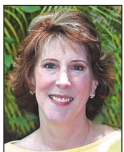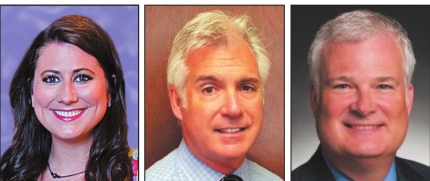A BRIDGE

Leaving hospital or rehab and returning home
Part one of a series on Senior Living
Your elderly parent is recovering from an illness or injury, and it’s time to take your loved one home from the hospital or rehab. This could be a scary time for Baby Boomers who are facing a scenario where they may still be in the workforce and cannot take care of mom or dad.
 There are options in today’s market that may help … services that include home health, sitting services or total in-home medical care.
There are options in today’s market that may help … services that include home health, sitting services or total in-home medical care.
Hailey Lewis, patient care liaison with Ark- La-Tex Home Health, said her agency comes into the patient’s home temporarily and helps them return to their previous health status or to a new base line and keeps them there.
“It’s a bridge from a hospital or rehab to the home to get you better,” Lewis said.
Lewis sees patients before they leave the hospital or rehab center and talks with them, then a nurse will meet them at their home to evaluate and assess the home for safety to ensure an accident doesn’t set back the recovery process.
“Throw rugs are huge safety hazards, as are small dogs that can run between your feet,” Lewis pointed out. “A lot of times a physical therapist will come out as well, so we will have a nurse, physical therapy, occupational therapy, speech therapy, a social worker, if needed and then a home health aide to assist with bathing.”
Remembering to take their medicine can prove to be a challenge for many seniors, and Lewis said there is a new safety feature for that problem.
“There are different medi-planners with timers on them to remind patients when it’s time to take their medicine so they don’t overor under-medicate themselves,” she said.
Funded by Medicare, Ark-La-Tex Home Health is overseen by the Department of Health and Hospitals and complements private pay sitting services.
“A lot of people feel more comfortable having that extra person there as a safety feature,” Lewis said. “The home health nurses, who come in two to three times a week, may be the ones to first notice if the patient seems like they may need someone extra there to help fix their lunch or just be there with them.”
But let’s say your loved one has needs that are more than that … more than a housekeeper who can make a sandwich. They need someone who can give them ’roundthe-clock medical care, but the family wants them to stay in their home to receive it.
Two of those options – Always Best Care Senior Services (ABC) and Preferred Care at Home – work with home health to transition the medical care of your loved one so they never have to leave their home.
“When we go into a home where the patient has been on home health or hospice, we are going to work with that agency to know what their goals are, what their care directives are and be sure we are supportive of that,” said Michael Corbin, director of business relations for Always Best Care. “Our over-reaching goal is if a senior desires to stay at home, then we are going to do everything possible to keep them in that comfortable home environment just as long as it’s feasibly possible.”
Although, he admits, there may come a time when the patient needs an additional level of care that cannot be provided at home due to equipment needs.
“We’re going to work to make sure they are comfortable as long as possible in their home,” he said.
Scott Green, co-owner of Preferred Care, points out that Northwest Louisiana has many “sitting services,” and there is a big difference in licensed agencies like Preferred Care and ABC and other “sitting services,” which are not governed by any state department.
“In the state of Louisiana, sitting services cannot by law provide hands-on care,” Green said. “If a person needs help getting in and out of a chair, bed, help bathing, dressing, help feeding, help with personal hygiene – any time a caregiver touches a person – the state requires a licensed agency to provide caregivers – that’s very important.”
He warns against hiring a caregiver who is looking for nothing more than a paycheck.
“When you go through an agency, you are going to get a caregiver who has been background checked, drug screened and gone through hours of training before they come into your home,” Corbin added. “If you hire somebody off Craig’s List or from church, you have no idea of their background or what training they have.”
And, Green said, the state does not have the funding to crack down on the sitting services that are not licensed.
“These sitting services out there operate at a much lower cost than a licensed agency,” Green pointed out. “It’s putting the citizens at risk. The biggest thing anybody can do is know the facts. Understand the services they want. Then find the right type of agency.”
Both agencies offer caregiver training at their facilities.
Green said caregivers at licensed agencies are required to have 16 hours of first aid, CPR, a clean background check, drug screening, clearance through the office of Attorney General and then maintain the 16 hours of education every year.
“Right now we are teaching how to transfer from a bed to a wheelchair and back, using different medical devices in a home, and that’s an important piece because if you have someone who doesn’t know how to properly transfer a patient and a senior falls and ends up with a broken bone, then things begin to degrade quickly,” Corbin said.
As with Ark-La-Tex Home Health, safety is at the forefront with ABC and Preferred Care.
When an agency receives a call for service, they take information over the phone, and assessment begins immediately. Within 24 hours, a care coordinator has scheduled an appointment in the home.
“If home health or hospice has been involved, we try to get them involved with the assessment,” Corbin said. “We want to see their home and what their current physical situation is and what their needs are.”
Green said Preferred Care also “walks the house.”
“We are big on fall prevention,” Green said, pointing out that older persons tend to be “pack rats.”
“As your mobility changes, you may be using less and less of your house,” Corbin added. “Suddenly, everything you need comes to a very small location in the house around you, and it’s not unusual for the senior citizen to suddenly find very few clear walkways … you see a lot of extension cords, which create hazards, especially if they have some mobility issues.”
Both agencies go through a process to match their patients to their caregiver.
“We’re going to do the grunt work to match personalities,” Green said. “You’re paying us to find the best qualified caregiver to meet the need.”
Preferred Care and ABC are private pay agencies. They supply some equipment and ensure the patient has everything they need.
Learn More:
Ways to prevent falls in the home and for patients to be safer.
• Keep walkways clear of clutter.
• Use night lights.
• Use assistive devices (canes, walkers).
• Use caution when walking on uneven pavements.
• Use brakes on wheelchairs with transfers.
• Stand and make sure you have balance before walking.
• Feel your feet.
• Be aware of rugs.
